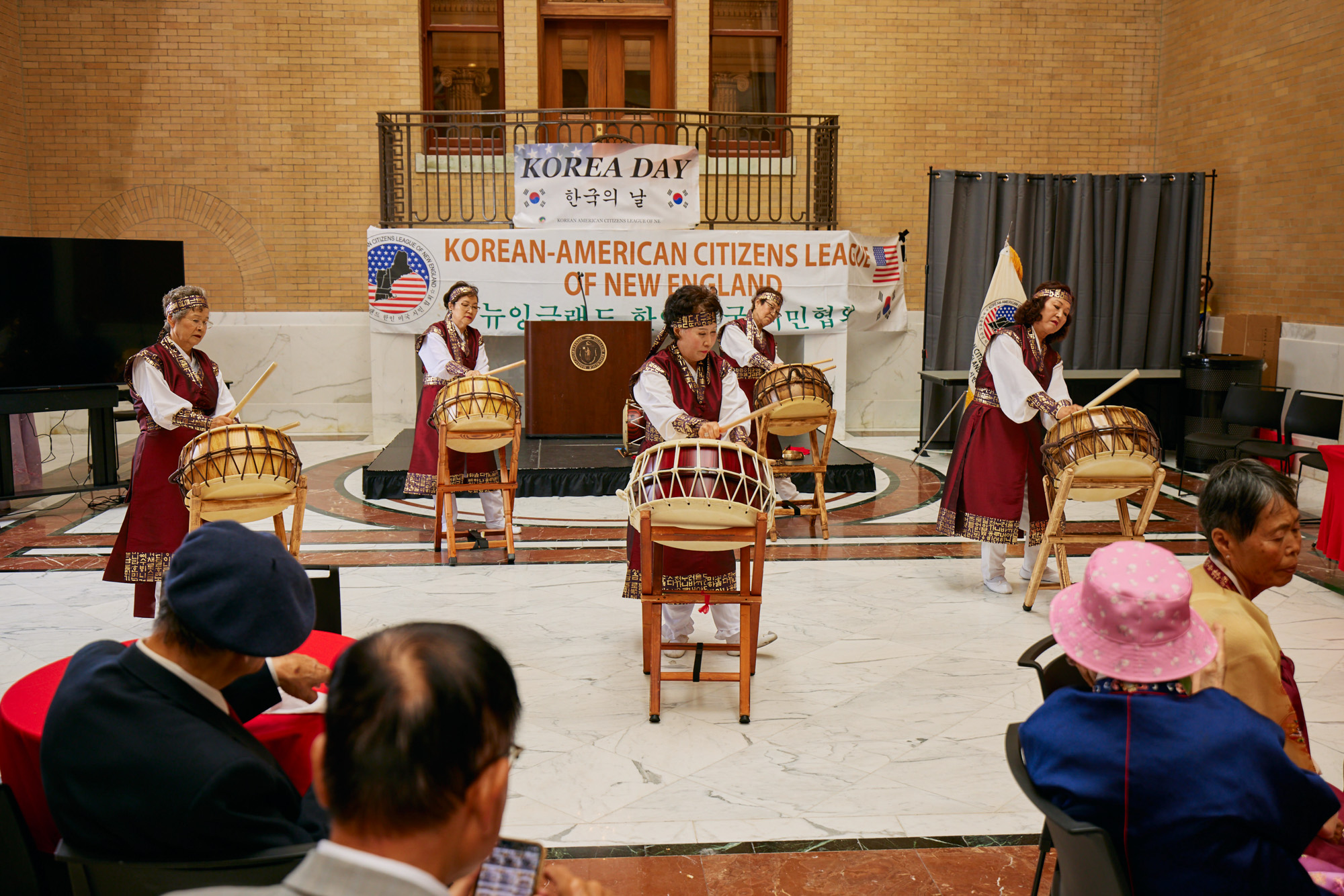The Great Hall of the Massachusetts State House was filled with chatter and energy on Friday as individuals of all ages gathered for Korea Day, an event that celebrates Korean culture in Boston. The celebration burst with displays of Korean customs as the State House was transformed into a hub of culture and community spirit.
The Korean-American Citizens League of New England hosted its sixth annual Korea Day celebration at the Massachusetts State House. The free event featured traditional Korean food, live music performances, cultural activities and information on community outreach programs.
“There’s a lot of interest in Korean media, Korean food, Korean music, Korean celebrities, Korean film,” Christine Lee, executive director of the KACL, said. “But who are the people behind that?”

Lee said Korea Day is a way to answer this question by providing a space for the Korean community to connect and a way for outreach organizations to offer their services to Korean Americans in the area.
This year, KACL partnered with multiple organizations — including Asian American and Pacific Islanders Commission, Massachusetts Health Connector, Asian Task Force Against Domestic Violence and the Korean Culture Society of Boston — to promote outreach and add an educational aspect to the event.
“KACL is trying to bring all these Korean associations and organizations under one roof to show and present to our guests who we are, what we do, how they can get involved and really celebrate with us,” Lee said. “Regardless of if you are Korean or if you’re not … We want to create a space where it’s very interactive.”
Linda Champion, president of the KACL, said Korea Day is a chance to show community members the unique aspects of Korean culture and create a space for everyone to celebrate it.
“Everyone wants to have a place where they belong,” Champion said. “We just want to make sure everyone knows that they are included … You can be Korean, or you could just love Korea and Korean people and participate and attend any of our events.”
The event is rooted in an “expression of love for the country,” she said. “This is the day that we recognize and we show you who we are.”
Upon arrival, guests received flyers to use as stamp cards, and they could collect stickers by participating in or learning about the certain Korean custom at each station at the celebration. Once a card had three stickers, guests could exchange it to receive a Korean lunch, with options including several types of kimchi, gimbap and Korean corn dogs.
The event hosted interactive booths, including a Korean calligraphy booth where guests could write their names on name cards using Korean characters. Guests could also visit tables to craft origami made with Hanji, a traditional handmade Korean paper. Nanta, a group of traditional Korean drummers, played in front of the crowd.
Champion cited the high percentage of Koreans living in poverty in the United States, despite the strong alliance between the countries. She also stressed the need for Korean visibility in American cities and highlighted the resources present at the event.
“I feel like as Asian Americans in general, it’s always nice to have a community, and I feel like sometimes it gets lost, especially in Boston,” Gina Kim, a Korean-American resident of Boston, said. “I think [Korea Day] is a great cultural thing.”
Champion said that the participation of Korean college students in events such as Korea Day is “the missing piece” and urges students to come to future celebrations.
“Being Korean-American isn’t just one image,” Lee said. “We have people that come from a lot of different backgrounds and who have a lot of amazing stories, but what is shared is that pride in being Korean and that shared heritage.”



















































































































Olivia Lee • Oct 10, 2024 at 2:21 pm
Seems like a great event hosted by a great organization. I hope to attend next year!
Jane Cowles • Oct 9, 2024 at 10:50 pm
The Korean people have had a unique experience and are such a strong and rich culture. Tate’s writing gives us a brief glimpse of the experience of the people who have found a home in America, who show us what a generous people they are, and let’s us join them in the celebration of their culture & traditions. I hope to get more writers like this.
Bradford Dale • Oct 8, 2024 at 2:57 pm
Thanks for the informative and refreshing story. Your descriptions of the interactive booths and the ‘stamp cards’ awarded to participants that could then be exchanged for a Korean lunch was ingenious. I hope this article reaches a wide readership.
Elizabeth Lemon • Oct 8, 2024 at 2:09 pm
Thanks for sharing this colorful, important story. I love that they’re including everyone to learn about their culture and want to be inclusive. This is especially needed in these dark times.